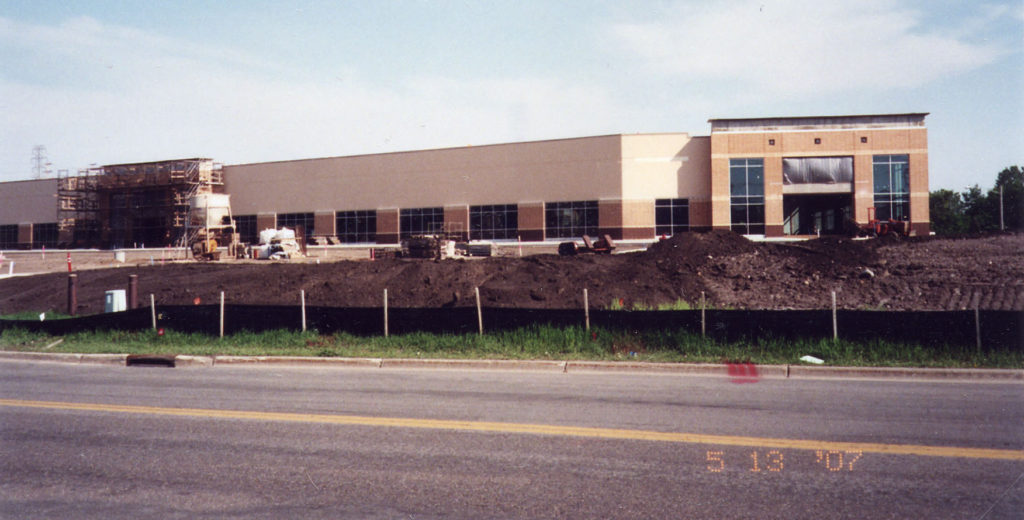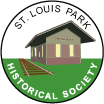This was the former site of Monitor Drill, which operated here from 1892 to 1929. According to the EPA, metal refining, fabricating, and associated activities were conducted at this site until 1903, when a secondary lead smelting operation was started. Solid wastes generated by the manufacturing facilities were stored in a slag storage area onsite. Liquid wastes were discharged through process sewers to the municipal sewer system.
National Lead (NL Industries) purchased the site in 1928 and operated the lead smelting facility from 1940 until 1979. [National Lead is thought to have come to St. Louis Park in about 1934.]
However, there were apparently other industries in the general area as well:
- The 1933 Village directory shows the Carbine and Carbon Chemical Corporation at Lake and Monitor Streets.
- The 1938 directory shows Unexcelled Fireworks “The World’s Largest Manufacturer of Commercial and Display Fireworks” – at Highway 7 and Hampshire.
In 1963 National Lead sold some of its property to the Golden Auto Reduction Yard, which had the address 7003 W. Lake Street.
On August 22, 1979, the National Lead smelting operation was sold to Taracorp, Inc. an Atlanta-based company headed by James Taratoot. Although there were concerns about lead levels, runoff, etc., the City issued a permit.
The site was first investigated by the EPA in 1980 for contamination of the site and ground water.
The plant ceased operations in 1981. [Closed smelter in May 1982]
Lions Field was also part of the Taracorp parcel. In 1979 soil tests showed a high level of lead. The ball field was closed down in April 1981.
In September 1983 it became a Federal-designated Superfund site.
In December 1984 workers secured the property from trespassers and vandals who apparently were not afraid of lead poisoning. The City had to pay the cost, as Taracorp was in bankruptcy.
Under an administrative order by consent (AOC) signed on March 8, 1985, between NL Industries, MPCA and EPA, NL Industries conducted onsite investigations and cleanup activities between 1985 and 1988. This included the following: restricting access to the site; removing contaminated onsite soils to a federally-approved facility and backfilling with clean soils; revegetating the excavated area; cleaning and demolishing several onsite buildings; installation of an asphalt cap; and long-term monitoring of groundwater.
It was also required to investigate the level of lead that may have blown from the site onto nearby residential land. One yard was found to have an elevated level of lead, and although it was not found to be attributable to the National Lead site, the company agreed to clean it up.
In the 1980s and 1990s Golden’s original white building was the site of a pawn shop and the former plant site was a storage yard and overflow parking for Methodist Hospital.

The site was deleted from the Superfund’s National Priorities List on May 21, 1998, but subject to five year reviews.
In 2001 part of the property was still classified “Contamination A” by the Minnesota Pollution Control Agency.
On September 17, 2004, Real Estate Recycling Acquisitions LLC (an experienced Brownfield developer), entered the site into MPCA’s Voluntary Investigation and Cleanup Program. After completing the MPCA-approved investigation, RER submitted its voluntary response action plan. The plan provided for the replacement of the existing asphalt cap with a combination of new building footings, foundations and floor, new asphalt park and drive areas and green space with clean soil cover and revegetation. To treat the capped-but-untreated soil, the developer mixed a chemical into the soil to stabilize the lead and hold it in place. It was then covered with a thicker cap.
The remaining structures were removed in 2006.
In 2006 Developer Real Estate Recycling built an 80,000 [95,550] square ft. office and showroom building on a 9.5 acre site that included both sides of the vacated Hampshire Ave. The site included the former building that was at 6651 Highway 7.
Of the $19.3 million the project cost, $1 million came from the Metropolitan Council, $1.9 million from the State, and almost $5 million from the Hennepin County Environmental Response Fund. St. Louis Park contributed $2.4 million in TIF funding.
The Highway 7 Corporate Center opened in 2007.

One of the businesses in the Corporate Center is Rubble Tile. Click Here for a story about this business in the St. Louis Park Magazine, November 2012.
